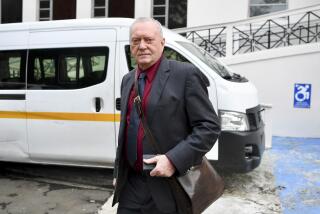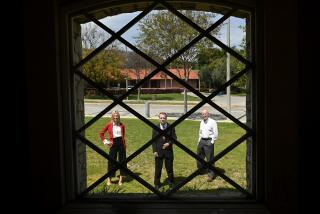Upholds Deadline Despite Waivers : Judge Drops Bank Fraud Charges Against Builder
- Share via
LONG BEACH — A federal judge has thrown out bank fraud charges against Long Beach developer Craig E. Caldwell on grounds that the government waited too long to indict him.
U. S. District Judge James M. Ideman said that even though Caldwell signed waivers regarding the statue of limitation, prosecutors should have been mindful of the five-year limitation for indictment on the alleged crimes.
The prosecutor, Assistant U.S. Atty. Patricia L. Collins, said she plans to appeal the decision.
“I told the judge I was astounded” at his ruling, Collins said. “I was astounded because he was creating a requirement that did not exist in law.”
Caldwell’s attorney, Thomas E. Holliday, said: “We are very pleased with the judge’s decision and believe it was absolutely appropriate under the circumstances.”
Caldwell, 37, owner of Caldwell Enterprises of Long Beach, was indicted last September by a federal grand jury in connection with allegedly fraudulent loans made in 1981 by the now-defunct Western National Bank of Santa Ana.
Loan Exceeded Limit
The former chairman and majority stockholder in the bank, Caldwell was accused of violating federal banking regulations by making false statements on loan applications and of misapplying bank funds. He was alleged to have personally borrowed $200,000, which exceeded the limit of $70,000 for loans to bank officers.
The indictment alleged that Caldwell arranged loans totaling $590,000 for three associates without the knowledge of the bank. In securing questionable loans cited by prosecutors, Caldwell allegedly made false entries in bank records and had borrowers submit inflated estimates of their net worth.
Holliday said Caldwell would have been cleared of the allegations if the case had gone to trial.
“We believe the conduct of Mr. Caldwell was absolutely proper and that the transactions are perfectly legitimate. We are confident if this matter were to be tried, he would be found innocent,” Holliday said.
Waived Time Limit
While Caldwell attempted to produce evidence that would persuade prosecutors to drop their investigation, he signed several waivers in which he agreed not to demand that prosecutors seek an indictment within the five-year statute of limitations, which expired in 1986, Collins said.
She said precedent specifically allows an open-ended waiver as long as the government files an indictment within a reasonable period of time.
But Holliday said it is “the obligation of the prosecution to ensure that the case is tried within the statutory period or they are specifically barred” from ever filing charges.
Caldwell has invested heavily in downtown Long Beach property for about a decade. He built a condominium project of about 200 units at 4th Street and Golden Avenue in 1984. Two of his downtown commercial buildings were torn down by the city that same year after condemnation proceedings that charged him with failing to correct substandard conditions.
More to Read
Sign up for Essential California
The most important California stories and recommendations in your inbox every morning.
You may occasionally receive promotional content from the Los Angeles Times.













